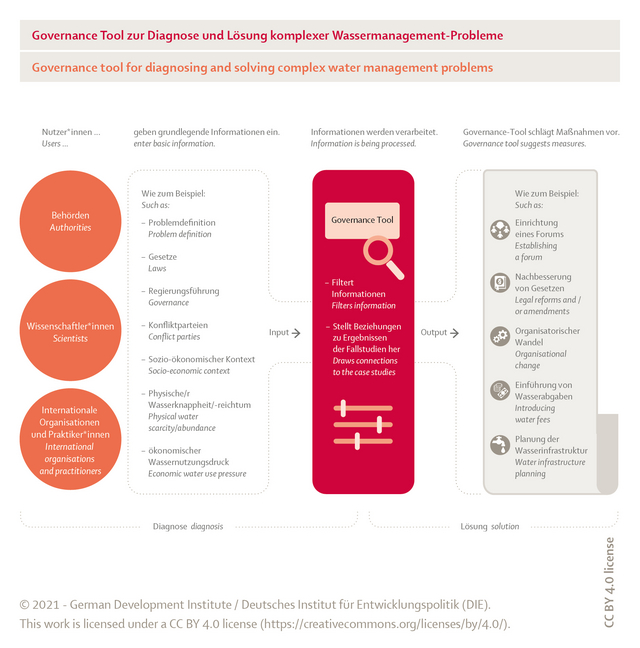A diagnostic approach improves Integrated Water Resource Management
Water is a vital resource. Access to and use of water are often closely linked to matters of health, economic development, social cohesion and cultural practice. Effective and fair resource management is essential when it comes to mediating between competing usage claims and safeguarding the rights of marginalised groups. Diagnostic approaches can allow for comparisons between solutions that originate from different countries and contexts.
Globally, pollution and water resource scarcity are on the rise, endangering ecosystems and the livelihoods, health, social relations and spiritual practices of countless people. This trend has an especially heavy impact on marginalised population groups. This applies to residents of poor rural regions without access to a central water supply, for instance, or to indigenous peoples whose right to participation in political processes and to the protection of their cultural practices is often insufficiently recognized and implemented. The Sustainable Development Goals (SDGs) also make reference to sustainable water management, sanitation for all and integrated water resource management, which have not yet been achieved in many industrialised nations either. Technical, economic and regulatory blue-print solutions often fail to provide adequate solutions in mediating between different usage claims. Instead, the specific context must be taken into account in order to effectively improve coordination and cooperation between water-using sectors (e.g. agriculture, mining, water suppliers), administrative (e.g. national and regional authorities) and geographical units (e.g. be-tween river basins and the local authorities bordering them). In many cases, there are also systemic and political hurdles to contend with. What innovative approaches exist that identify solutions to complex problems, which involve many different interest groups and which might occur under rapidly changing conditions?
As part of the research project ‘Increasing Good Governance for Achieving the Objectives of Integrated Water Resources Management (STEER)’, that was funded by the German Federal Ministry of Education and Research (BMBF), the German Development Institute / Deutsches Institut für Entwicklungspolitik (DIE) worked with its consortium partners at Osnabrück University and the University of Kassel, the Ecologic Institute, and stakeholders in Germany, Iran, Mongolia, Spain and South Africa from 2017 to 2020 to address these questions. In six in-depth case studies, the project team developed approaches together with its local partners to enhance the capacity of public authorities and other stakeholders (such as water boards and farmers) to solve complex water problems. To this end, the team devised a diagnostic approach which was trialled and adapted in the case study analyses. Like a medical diagnosis, this approach makes it possible to identify the underlying causes of a coordination issue, such as water pollution resulting from mining activities in northern Mongolia. In order to understand the factors facilitating or hindering improved coordination, the approach examines aspects of water and natural resource management, such as the respective legal framework, government organisation and the natural and socio-political context. In so doing, it focuses on the specific context of the problem and can at the same time be applied across a range of case studies. By enabling comparisons across different contexts without downplaying their differences, the approach allows for a better understanding of the extent to which factors contributing to effective coordination in one case study could also be beneficial in another scenario.
Systematically involving local stakeholders in all project phases afforded the results a high degree of practical relevance and supported capacity development among the participating stakeholders. Advisory papers were drafted for all six case studies and are available in the Institute’s Briefing Paper series.
The web-based STEER governance tool was developed on the basis of the in-depth case studies and 21 less detailed validation case studies. Its target groups include authorities, civil society representatives, researchers and private sector stakeholders tasked with or interested in resolving complex water resource management issues. Users are invited to enter information about the respective problem, the river basin and the broader institutional and biophysical context. On this basis, the tool provides practical ideas for governance instruments aimed at improving coordination and cooperation and thus at solving the water resource management problem in question.
The governance tool will continue to be used and expanded after the project has ended, as users add other case studies. It thus serves as a key building block in international learning processes and as a platform for sharing experiences in water resource management. In keeping with SDG 6.5, the STEER governance tool is providing innovative impetus for implementing integrated water resource management (IWRM) and making the results of scientific research utilisable for the policy-making process. In contexts where there is a lack of financial and human resources for more in-depth analysis, the tool provides an initial proposal for diagnosing the problem and ideas for solutions. The project results will also be published in a special issue of Environmental Science and Policy.
The case study analyses have shown that coherently assigned responsibilities for individual authorities and decentralisation can support the effective balancing of different sectoral interests. Such effective balancing can only be achieved, however, when coordination efforts between stakeholders from different sectors and administrative levels are truly translated into practical action in an everyday context.
The authors

Dr. Ines Dombrowsky is Head of the Programme “Environmantal Governance and Transformation to Sustainability”. Her research focuses on questions of multi-level and cross-sectoral coordination, cooperation and policy integration in environmental governance.

Mirja Schoderer is Researcher in the Programme “Environmantal Governance and Transformation to Sustainability” at DIE. Her work focuses on water conflicts, primarily in relation to natural resource extraction, and combines institutional analysis and political ecology.

